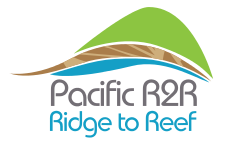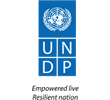The programme was developed to provide an opportunity for PacSIDS to develop and implement integrated approaches for the sustainable development of island economies and communities.
The practical application of R2R principles* present PacSIDS with a unique opportunity to:
UPSCALE:
Test, refine, replicate and upscale effective mainstreaming efforts of ICM/IWRM/SLM/SFM concepts, practices and policies.
BUILD CAPACITY:
Build capacity of local professionals, new stakeholder groups, and community leaders to build sufficient human capital on the islands for leading adoption of integrated and participatory mechanisms to complement traditional measure and approaches.
SUPPORT LIVELIHOODS:
Introduced resilient measures in catchment pilot demonstrations to reduce economic losses, increase farmer income, and sustain drinking water supplies.
IMPROVE PUBLIC HEALTH:
Improve human health with continued access to safe drinking water during droughts and reduction of sewage pollution of groundwater supplies and shellfish.
The specific Global Environmental Benefits (GEBS) delivered through each national R2R demonstration project will be defined within each country’s respective Project Identification Form.
Global Environmental Benefits
- Protection and/or sustainable use of globally significant biodiversity, including agro-biodiversity, in Pacific Island forests, agricultural lands, watersheds, and coastal areas;
- Improved provision of agro-ecosystem, forest, watershed, and coastal area ecosystem goods and services;
- Reduced GHG emissions from agriculture, deforestation, forest and coastal degradation and increased carbon sequestration;
- Enhance climate resilience of Pacific Island ecosystems and societies through R2R program support to low emission, climate resilient development pathways; and
- Improved management of coastal and freshwater resources of SIDS consistent with the GEF 5 IW Strategy, including conservation of coastal ‘Blue Forests’ that complement MPAs under biodiversity.
National Benefits
Adoption of ICM policies and measures will involve planning for infrastructure investments to prevent high risk areas, and reduce emergency costs for national budgets in reaction to disasters.
Local Benefits
Improved ecosystem services related to:
- Food production
- Safe Drinking Water
- Productive Soils,
- Clean and healthy environments and resilience to impacts of climate change
Restoration and protection of mangroves
- Enhance local fishing incomes
- Reduce the vulnerability of coastal villages and urban areas from storm surges and sea-level rise
SFM
- Secure livelihoods
- Enhanced food security
Drought management and drinking water contamination measures
- Improve public health
Cross-cutting
Gender
- Enhance women’s engagement to optimize impact of interventions at all levels, improving livelihoods.





